What I need to know about My Child's Bedwetting
On this page:
- Why does my child wet the bed?
- How can I help my child stay dry?
- Should I take my child to see a doctor?
- What treatments can help my child stay dry?
- Eating, Diet, and Nutrition
- Points to Remember
- Hope through Research
- Pronunciation Guide
- For More Information
- Acknowledgments
Why does my child wet the bed?
In most cases, the exact cause of bedwetting is not known. But many possible causes exist. Your child’s bladder* might be too small. Or the amount of urine produced overnight is too much for your child’s bladder to hold. As a result, your child’s bladder fills up before the night is over. Some children sleep so deeply that they don’t wake up when they need to urinate. Others simply take longer to learn bladder control. Many children wet the bed until they are 5 years old or even older.
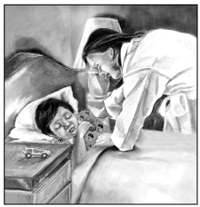
Bedwetting often runs in families. If both parents wet the bed as children, their child is likely to have the same problem. If only one parent has a history of bedwetting, the child has about a 30 percent chance of having the problem. Some children wet the bed even if neither parent ever did.
A child who has been dry for several months or even years may start wetting the bed. The cause might be emotional stress, such as the loss of a loved one, problems at school, a new sibling, or even toilet training too early.
Bedwetting is not your child’s fault. Children rarely wet the bed on purpose. You can help your child by learning about the different causes and treatments for bedwetting.
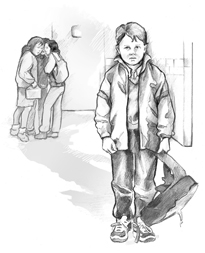
*See the Pronunciation Guide for tips on how to say the underlined words.
[Top]
How can I help my child stay dry?
You can take several steps to help your child stay dry. Make sure your child drinks enough fluids throughout the day. A child who doesn’t drink enough during the day may drink a lot before bedtime, causing wetness at night. Talk with your child’s doctor about how much your child should drink each day. Have your child avoid drinks with caffeine, such as colas or tea. Drinks with caffeine speed up urine production. Give your child one drink with dinner and explain that it will be the last drink before going to bed. Make sure your child uses the bathroom just before bed. Many children will still wet the bed, but these steps may be helpful.
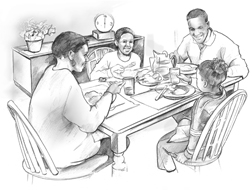
Children may feel bad about wetting the bed, so letting them know they are not to blame is important. Bedwetting is not a behavior problem. Scolding and punishment will not help your child stay dry. Be supportive. Praise your child for dry nights.
Most children grow out of bedwetting. Some children just take more time than others.
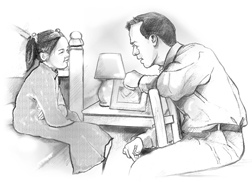
[Top]
Should I take my child to see a doctor?
Children younger than 5 do not need to see a doctor for bedwetting. Many children do not stay dry at night until age 7. A single episode of bedwetting should not cause alarm, even in an older child.
If your child is 7 years old or older and wets the bed more than two or three times in a week, a doctor may be able to help. If both day and night wetting occur after age 5, your child should see a doctor before age 7.
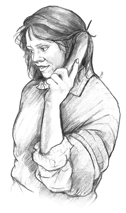
The doctor will ask questions about your child’s health and the wetting problem, conduct a physical exam, and ask your child for a urine sample. The doctor will look for signs of health problems that can cause bedwetting, including the following:
- fever and bacteria in the urine—signs of infection
- weight loss—a sign of diabetes, a condition where blood glucose, also called blood sugar, is too high
- high blood pressure—a sign of a kidney problem
- poor reflexes in the legs or feet—a sign of a nerve problem
- a hard mass that can be felt in the stomach area—a sign of constipation, a condition in which a child has fewer than two bowel movements a week and stools can be hard, dry, small, and difficult to pass
- swollen tonsils, mouth breathing, or poor growth—a sign of sleep apnea, a condition in which breathing stops during sleep
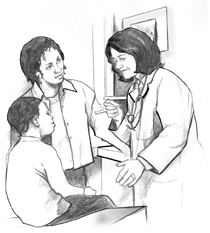
The doctor may also ask your child about changes at home or school that may be causing emotional stress. In most cases, the doctor doesn’t find any specific cause for bedwetting. If a health problem is found, the doctor will talk to you about treatment options. If your child is stressed, the doctor may be able to give your child strategies for dealing with the stress.
[Top]
What treatments can help my child stay dry?
Treatments for bedwetting include bladder training, moisture alarms, and medicines. Talk with the doctor and your child about which ones to try.
Bladder Training
Bladder training can help your child hold urine longer. Write down what times your child urinates during the day. Then figure out the amount of time between trips to the bathroom. After a day or two, have your child try to wait an extra 15 minutes before using the bathroom. For example, if a trip to the bathroom usually occurs at 3:30 p.m., have your child wait until 3:45 p.m. Slowly make the wait time longer and longer. This method helps stretch your child’s bladder to hold more urine. Be patient. Bladder training can take several weeks or even months.
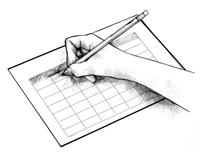
Moisture Alarm
A small moisture alarm can be put in your child’s bed or underwear. With the first drops of urine, the alarm triggers a bell or buzzer that wakes your child. Your child can then stop the flow of urine, get up, and use the bathroom. Waking also teaches your child how a full bladder feels.

Medicine
Medicine is available to treat bedwetting. The medicine used most often slows down how fast the body makes urine. Though medicine for bedwetting works well, wetting often returns when the child stops taking the medicine. If this occurs, keeping the child on medicine for a longer time may help.
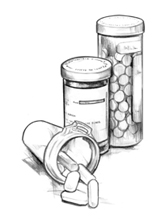
[Top]
Eating, Diet, and Nutrition
Eating, diet, and nutrition have not been shown to play a role in causing or preventing bedwetting in children, though making sure your child drinks enough throughout the day and avoiding caffeine intake may be helpful.
[Top]
Points to Remember
- In most cases, the exact cause of bedwetting is not known. But many possible causes exist.
- Many children wet the bed until they are 5 years old or even older.
- Scolding and punishment will not help your child stay dry.
- Children younger than 5 do not need to see a doctor for bedwetting. If your child is 7 years old or older and wets the bed more than two or three times in a week, a doctor may be able to help. If both day and night wetting occur after age 5, your child should see a doctor before age 7.
- Treatments for bedwetting include bladder training, moisture alarms, and medicine. Talk with the doctor and your child about which ones to try.
- Most children grow out of bedwetting naturally.
[Top]
Hope through Research
The National Institute of Diabetes and Digestive and Kidney Diseases (NIDDK) conducts and supports research to help people with urologic diseases, including children. The NIDDK’s Division of Kidney, Urologic, and Hematologic Diseases maintains the Pediatric Urology Program, which supports research into the early development of the urinary tract.
Participants in clinical trials can play a more active role in their own health care, gain access to new research treatments before they are widely available, and help others by contributing to medical research. For information about current studies, visit www.ClinicalTrials.gov.
[Top]
Pronunciation Guide
bladder (BLAD-ur)
caffeine (KAF-een)
constipation (KON-stih-PAY-shuhn)
diabetes (DY-uh-BEE-teez)
sleep apnea (sleep) (AP-nee-uh))
urinate (YOOR-ih-nayt)
[Top]
For More Information
American Academy of Pediatrics
National Headquarters
141 Northwest Point Boulevard
Elk Grove Village, IL 60007–1098
Phone: 1–800–433–9016 or 847–434–4000
Fax: 847–434–8000
Internet: www.aap.org 
American Urological Association Foundation
1000 Corporate Boulevard
Linthicum, MD 21090
Phone: 1–800–828–7866 or 410–689–3700
Fax: 410–689–3998
Email: auafoundation@auafoundation.org
Internet: www.UrologyHealth.org 
National Association for Continence
P.O. Box 1019
Charleston, SC 29402–1019
Phone: 1–800–BLADDER (1–800–252–3337) or 843–377–0900
Fax: 843–377–0905
Email: memberservices@nafc.org
Internet: www.nafc.org 
National Kidney Foundation
30 East 33rd Street
New York, NY 10016
Phone: 1–800–622–9010 or 212–889–2210
Fax: 212–689–9261
Internet: www.kidney.org 
The Simon Foundation for Continence
P.O. Box 815
Wilmette, IL 60091
Phone: 1–800–23–SIMON (1–800–237–4666) or 847–864–3913
Fax: 847–864–9758
Internet: www.simonfoundation.org 
Society of Urologic Nurses and Associates
East Holly Avenue, Box 56
Pitman, NJ 08071–0056
Phone: 1–888–TAP–SUNA (1–888–827–7862) or 856–256–2335
Email: suna@ajj.com
Internet: www.suna.org 
[Top]
Acknowledgments
Publications produced by the Clearinghouse are carefully reviewed by both NIDDK scientists and outside experts. The National Kidney and Urologic Diseases Information Clearinghouse would like to thank the following individuals for assisting with the scientific and editorial review of the original version of this publication:
Stuart Bauer, M.D.
Harvard University, Boston
Stephen Koff, M.D.
The Ohio State University, Columbus
Thank you also to Shirl Lyn Woods of the Johns Hopkins Hospital for facilitating field-testing of the original version of this publication.
[Top]
National Kidney and Urologic Diseases Information Clearinghouse
3 Information Way
Bethesda, MD 20892–3580
Phone: 1–800–891–5390
TTY: 1–866–569–1162
Fax: 703–738–4929
Email: nkudic@info.niddk.nih.gov
Internet: www.urologic.niddk.nih.gov
The National Kidney and Urologic Diseases Information Clearinghouse (NKUDIC) is a service of the National Institute of Diabetes and Digestive and Kidney Diseases (NIDDK). The NIDDK is part of the National Institutes of Health of the U.S. Department of Health and Human Services. Established in 1987, the Clearinghouse provides information about diseases of the kidneys and urologic system to people with kidney and urologic disorders and to their families, health care professionals, and the public. The NKUDIC answers inquiries, develops and distributes publications, and works closely with professional and patient organizations and Government agencies to coordinate resources about kidney and urologic diseases.
This publication is not copyrighted. The Clearinghouse encourages users of this publication to duplicate and distribute as many copies as desired.
This publication may contain information about medications. When prepared, this publication included the most current information available. For updates or for questions about any medications, contact the U.S. Food and Drug Administration toll-free at 1–888–INFO–FDA (1–888–463–6332) or visit www.fda.gov. Consult your health care provider for more information.
NIH Publication No. 12–5631
June 2012
[Top]
Page last updated June 26, 2012






